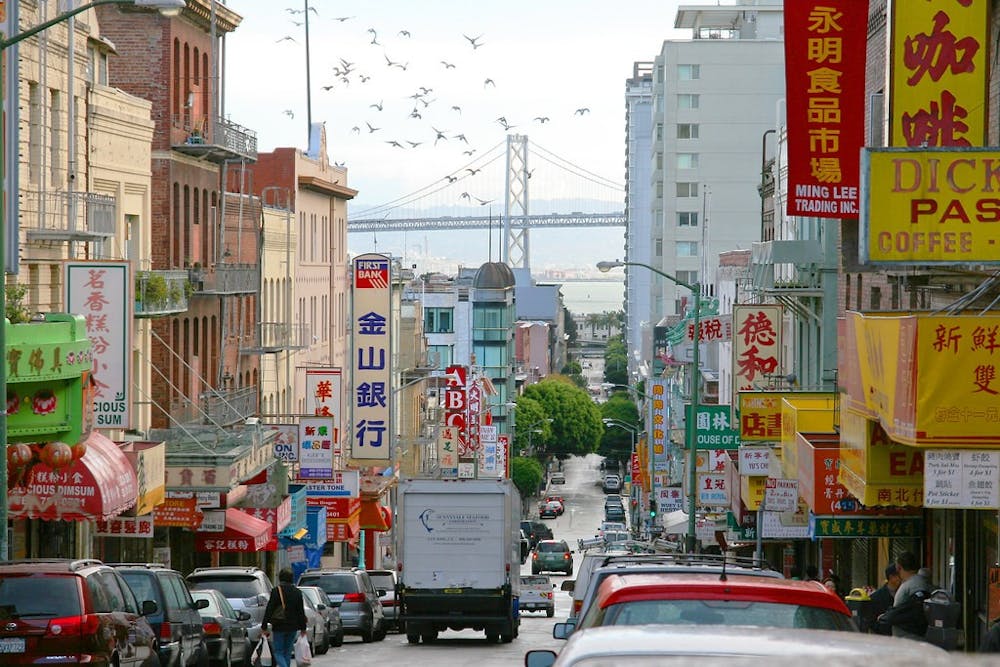In New York’s Chinatown, where the fish outnumber people, I am a foreigner among my own blood. A thousand glassy eyes stare at me, white and hungry. Hunchbacked men gut the silver-scaled spread of hollowed-out salmon, hands calloused like the topography of the Himalayas, knuckles scabbed like borders wrenched apart. No one stops. No one notices. My mom and I walk to the hazy pulse of the city, swaying with this chorus of bodies.
This is the portrait of my Saturday afternoons: wandering through crowded market stalls overflowing with Peking duck and roasted squid, the scent of soup dumplings permeating the air. I watch as my mom bargains with a toothless vendor for chicken feet, as Mandarin syllables clash like a discordant symphony, a music I no longer know how to sing.
Growing up, writing was my haven. My friends teased me for carrying a marble notebook wherever I went, pages brimming with mediocre poems my 12-year-old mind thought Shakespearean. Words, I discovered, have the power to forge rivers, oceans, mountains. They immortalize the rise and fall of civilizations, etch our names in rock and dust. Yet when I told my mom about my dreams of becoming a writer, she sighed.
No Asian writers in America.
You’re wrong, I insisted. I’m going to make it right here.
Thus, Chinatown — packed with bodies existing in the negative space of America’s racial binary, slack-jawed native tongues reminding me of my otherness — became a space of resentment. I didn’t understand my mom's attachment to these cluttered, charcoal streets, or why she referred to Chinatown as home.
My parents’ English is jagged and messy. Their tongues, knit with the acrid tang of ginseng and tsingtao, never knew how to cleanse themselves of their homeland. At the grocery store, when middle-aged white women snickered at my mom’s accent, she stopped speaking at all, knowing she could not mispronounce silence.
Yet in the bustling streets of Chinatown, my mom is anything but silent. Among the aisles of lychees and mooncakes, steaming baozhi and burning tea leaves, my mom speaks the language of resilience, fluent in its cadences. In the seafood aisle, men with hardened hands fillet the sleek bodies of dying fish, and in their almond-eyed stares I now find an unspoken understanding. All around me, people are discovering semblances of themselves.

As I saw the way my mom’s eyes lit up when conversing in her native tongue, or the way our bodies blended seamlessly into the endless sea of people with monolids and yellow skin, I realized the plight of viewing my culture as an obstacle. I didn’t need to venture into white America to achieve my dream of becoming a writer — the inspiration I sought was right here. There is art in the way we speak, in the stories we share, in the legacies we carry. Our voices are beautiful ghosts, finding visibility in each other.
Gradually, Chinatown transformed from the subject of my discomfort to the subject of my poetry. In conversations with Chinatown residents, conducting interviews and writing essays on the Asian diaspora, and reciting my poems at open mics, I am reclaiming my roots. I am weaving the lost strands of my heritage into something greater, creating a mosaic of our own history with this tapestry of stories.
Now, as a first-year at Princeton, I will carry their words with me as I build a new chapter. While weekends with my mom in Chinatown will soon feel like a distant dream, a memory clean and gentle as wind, I will continue putting pen to paper, to forge my own legacy from the place that has raised me.
I write for the war veteran who carries his own marble notebook, learning English at 67 to communicate with his granddaughter. I write for the transgender woman grappling with the intersection of her Asian and queer identities. I write for the children racing one another barefoot over dusty roads, the rhythm of their feet against earth its own soaring melody. How the city trembles in the wake of its young! The age of silence is over. We have sparked an anthem with our voices. All around me, the confluence of English and Mandarin translates to Young one, we built this dream for you — now carry it forward.









